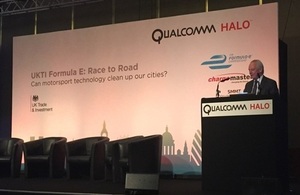Formula E showcases UK automotive expertise
Automotive industry leaders gathered in London ahead of Formula E final to discuss how novel technologies can move from race track to road.

The inaugural Formula E season reached its climax in London’s Battersea Park on Sunday 30 June 2015. The UK is:
- a world leader in the development of low carbon technologies
- home to more F1 teams than any other country
- a major player in the development of the pioneering technologies that make the Formula E race series possible
From race track to road
These technologies are increasingly making the transition from race track to public road, something which was showcased at the ‘Formula E: Race to Road’ event on Friday 28 June. The event was organised by UK Trade and Investment (UKTI). It highlighted the government’s commitment to working with the UK’s motorsport industry to further develop technology in the automotive sector. As well as hearing from leading industry figures, motorsports suppliers met with the wider automotive community. Suppliers discussed how Formula E technology can assist in the development of road-going electric cars.
Speaking at the event, Lord Maude, Minister of State for Trade and Investment said:
Formula E has vital implications far beyond the motorsport industry. It is a locus of R&D around electric cars; offers an important opportunity to promote and generate interest around these cars; and promotes clean energy and sustainability.
Already we are seeing Formula E teams working on ‘race to road’ programmes here in the UK.
Existing applications
These programmes are producing tangible results.
For example, in London 500 buses are being fitted with an energy recovery system conceived by Williams Formula One and manufactured by UK engineering company, GKN. This enables buses to improve their fuel economy and CO2 emissions by over 20%, and reduces their impact on air quality in central areas by an even greater amount. The system will soon go into full-scale production.
UK as a world leader
The UK is now Europe’s biggest market for low carbon cars. It accounted for 20% of all Electric Vehicle (EV) and plug-in hybrid electric vehicle (PHEV) sales in 2014. With 25% of European EV sales, the UK-made Nissan Leaf is a market leader.
Programmes such as the Advanced Propulsion Centre (APC) will build on the UK’s world leading capability by helping to finance the development of low carbon products to enter production. The APC is a joint government-industry initiative worth over £1 billion.
Contact the Automotive Investment Organisation (AIO) to find out more about the UK’s automotive sector.